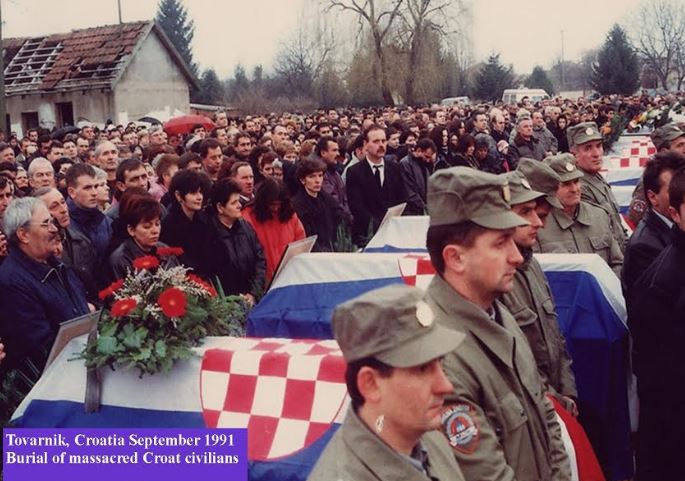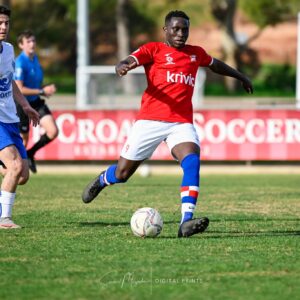International pressure upon Croatia to achieve reconciliation with its aggressor (Serbia) after the war had ended (1995 militarily and 1998 completion of reintegration of Serb-occupied Croatian territory which “required” the granting of amnesty to hundreds of Serb war criminals) has, without a doubt, proved detrimental to Croatia’s stability and progress into a fully functioning democracy and to the rights of war veterans as well as Croatian civilian victims. This pressure for reconciliation included various avenues of equating the victim with the aggressor; Serbia’s unwillingness to accept its role as a brutal aggressor in the 1990’s war on the territory of former Yugoslavia has also been a significant factor in keeping Croatia back from pursuing goals of a full democracy and sovereignty founded on the Homeland War, which would as a matter of natural course include proper assistance mechanisms for civilian and combatant victims. Croats were after all brutalised, ethnically cleansed, murdered, raped, tortured … and Serbia shows no sign of paying for damages its forces, people and political allies had caused in Croatia during 1990’s.
After the Homeland War ended completely, it was undoubtedly the responsibility of the Croatian government to ensure the security and well-being of those who had suffered and sustained personal losses during the war, either as veterans or civilians. Mechanisms of compensation should have been developed and fully implemented soon after the war’s end and yet here we are in 2021 and perhaps thousands of war veterans in Croatia still have not had their war-veteran status sorted and live like paupers, almost four thousand having committed suicide; assistance to civilian victims has also not been properly attended to. Monetary compensation may never be enough to recompense the harm incurred by the Croats, but it would certainly be a step in the right direction for the government to finally recognise and dignify the damage suffered by civilian victims in a clear and proper way and not dish out legislation that introduces yet another conundrum into the suffering of war victims. This should also be completed for all war veterans and with both of these measures the government may ultimately be pushed to recalibrate its national values and goals, elevating the victory against the aggressor in the Homeland War as its only foundation stone. This though is not likely to happen without pressure from grassroots and political opposition, excluding of course the SDP/Social Democrats and We Can/Možemo opposition that still practices communist Yugoslavia mindset.
It is good news that there is a new legislation currently before the Croatian Parliament with regards to compensation for civilian victims of the Homeland War in Croatia (Civilian Victims of Homeland War Act/ Zakon o civilinim stradalnicima Domovinskog rata). The discussions about the proposed law are generating sharp public rows and visible distress with concerns that the same legislation may enable a Serb aggressor/enemy from 1990’s to receive financial assistance from the Croatian taxpayer’s pockets.
These concerns regarding rebel Serbs being enabled for such war-civilian victim assistance is largely justified because of two facts. The first being that in the prelude to the full-blown Serb military and paramilitary aggression Serb civilians had a key role in terrorising their Croatian neighbours and preparing and assisting in what was to become the most horrible aggression and war since World War Two in Europe. Serb civilians on a large scale were complicit in the Serb aggression, ethnic cleansing of Croats and devastation and a relatively smaller number sided with Croatians and fought to defend Croatia from Serb aggression. The second reason why the above concerns are justified lies in the fact that there is no register of Serbs, who were also Croatian citizens and lived in Croatia, who had participated in any way in the aggression against Croatia.
There is no register of actual persons involved in the aggression full stop! It must be kept in mind that when it comes to Serb aggression against Croatia, in order to stop Croatia from seceding from communist Yugoslavia, the armed and the civilian Serbs in Croatia who subscribed to the idea of stopping Croatia in its path to independence fought collectively against Croats in both mind and deed.
The right-wing opposition in the Parliament, such as Miroslav Skoro’s Patriotic Movement and its MP Stipo Mlinaric Cipe, appears adamant and angry that this new legislation will, as they see it, provide a legal avenue for civilians among the Serb rebels and aggressors to receive compensation for injury they may have sustained during the war even though they were on the aggressor’s side; or their surviving families could benefit if they were killed during aggression against Croatia.
The government on the other hand, vehemently denies that possibility and its Minister for the veterans, Tomo Medved, says that civilian invalids from the Homeland War, as a basic right commensurate with the provision of this new legislation, can receive a personal disability allowance in the range of 114 to 3824 kuna, depending on the status and degree of damage to their body. It is estimated that up to 2,500 new beneficiaries of status rights are in full application of the law, including the disabled and family members of dead and missing civilians,” said Medved, referring to Mlinaric’s claims in which Mlinaric stated that it is shameful that the law is being passed only now to compensate civilian victims, parents of deceased children when it should have been passed a long time ago (as it has been over 25 years since the war ended).
Minister Medved negated Mlinaric’s claims that rebel Serb (aggressors) civilians could under this law be eligible for compensation and said that the law strictly states that members, helpers or associates of enemy military and paramilitary units who took part in the armed aggression against Croatia, as well as members of their families, cannot receive benefits under this law.
But, in fact, it is also true that the law provides that, providing they satisfy the criteria, all Croatian citizens are eligible to receive benefits under this law. So, given that Croatian governments have not bothered to create a register of Croatian Serbs who were engaged in any way in the Serb aggression against Croatia, the real possibility does indeed exist that a Croatian citizen of Serb extraction who engaged in activities of aggression during the 1990’s war could qualify for benefits under this law if he/she lines up the “right” sort of supporting testimonies even if these testimonies may be false statements and nothing more.
Judging from what has been unfolding in Croatia regarding this particular legislation during the week one may well be justified in siding with the Parliamentary opposition, Mlinaric for instance, rather than Minister Medved. Credibility must be given to the opinion that the law is not clear enough to exclude absolutely the possibility of enemy “civilians” receiving benefits under it. I put the word civilian in quotation marks because in the environment of brutal aggression against Croats even Serb civilians engaged in terrorising the Croatian people out of their homes and supported the Serb armed forces and paramilitary in ethnic cleansing and destruction.
If the latter were not the case, then why did the Zagreb-based, pro-communist Yugoslavia, communist crimes apologetics, NGO Documenta – Centre for Dealing with the Past and the Serbian National Council, which represents the Serb minority in Croatia, feel the need to launch a media campaign last Thursday entitled ‘Justice for Victims’, supporting the government’s plan to pass legislation that will grant benefits to civilian victims of the 1991-95 war. These NGOs and Pupovac do not appear to care about the Croatian victims.
“With this campaign, we want to improve the rights of civilian victims,” Serbian National Council president Milorad Pupovac, who is also an MP, told a press conference.
Pupovac added that for him, all civilian victims of the war, both the Croats who suffered in the besieged town of Vukovar in 1991 and the Serbs targeted after the Croatian Army’s Operation Storm in 1995 are his “brothers and sisters”!
Alarmingly, Prime Minister Andrej Plenkovic and his government did not bat an eyelash at these depraved and disgusting words that Pupovac had uttered. It is obvious that Milorad Pupovac, a leader of the Serb minority in Croatia whose own brothers were active Serb rebels in Croatia who ethnically cleansed, terrorised, raped, mass murdered Croats, is on a path for Croatia to recognise Serbs involved with the aggression and brutalities against Croats be recognised as civilians in terms of this new legislation. By doing that he is placing another nail in the false claim that the war of Serb aggression in Croatia was a civil war, which it was not!
Some human rights NGOs in Croatia have also come out, pointing out that Serb civilians could have difficulties proving that they did not aid or collaborate with the ‘enemy’. Why would they come out with this if they did not smell the same rat in the new legislation that Mlinaric and the right-wing parliamentary opposition smell!
No doubt about it, this law, if it passes without some additions and changes in line with expressed concerns, may become yet another notch in the string of notches tied to equating the victim with the aggressor, to give more credibility to the false idea that Croatian Homeland War was a civil war. If it was a civil war then the UN War Crimes Tribunal in the Hague would not have had jurisdiction, nor would it have been created!
The first victim of the Serbian aggression during early to mid 1990’s were the Croats who were removed from 30% of the Croatian territory, their homes and ancestral lands. That territory was not only occupied by the Yugoslav army and the local Serbs and ethnically cleansed of Croats, but in addition Serbs from other parts of Croatia or Bosnia were persuaded to resettle into abandoned Croatian homes in the cleansed territory for the Greater Serbia. Such behaviour escalated national animosities as the aggression spread on and on. It was a gruesome picture for Croats and the law for civilian victim compensation must be tight to ensure that no Serb civilian aiding the Serb military and paramilitary receives any assistance under it. Many Croatian victims of these Serb civilians are known throughout the world as many ended up as refugees settling in Western countries, many have died, and many are now too old to tell of their suffering at the hands of their Serb neighbours and pre-war “friends”. It is therefore the responsibility of both the government and the opposition in Croatia to ensure this law does differentiate strictly between the victim and the aggressor. Ina Vukic




